一般现在时(第三人称单数形式_)及练习
一般现在时讲解 动词三单 练习题

一般现在时讲解+动词三单+练习题定义:①表示现在的状态,如:Tomisastudent..②表示经常发生或习惯性的动作或状态,如:Weoftenplaybasketballtogether.③表示主语现在的性格、特征、水平,如:LucycanspeakFrench.结构:I.当谓语动词是be时谓语动词be包括am,is,are.其用法是:我(I)用am;你(you)用are;is用于他(him)她(her)它(it);复数人称都用are.-主要句式:1.肯定句式主语+be(am,are,is)+其他。
Sheisapretty.2.否认句式主语+be(am,are,is)+not+其他。
Sheisn’tpretty.3.一般疑问句将提前be(am,are,is),即:Be(am,are,is)+主语+其他?Isshepretty?肯定回答Yes,主语(必须是代词)+be(am,are,is)Yes,sheis.否认回答No,主语(必须是代词)+be(am,are,is)+not(必须用缩写形式isn't/aren't)No,sheisn’t.1.用be的适当形式填空1.---How____you?---I____fine.2.I___David,andmyfamilyname___Green.3.---Whatcolor___yourclock?---It___white.4.---What___thisinEnglish?---It___anapple.5.Toy___mybrother.David____mybrother,too.They___mybrothers.2..将下面的句子变成一般疑问句并作出回答1.Thatismyfootball.2.Thosearehisbooks.3.JimandTomaregoodfriends.4.MybirthdayisNovember1st.5.Hissonistwelveyearsold.3.将下面的句子变成否认句1.Hiscardisonthetable.2.Thereissomewaterinthebottle.3.BobandTonyareourfriends.II.当谓语动词是实义动词时1.当主语是第一人称(____\___);第二人称(____)及复数时(1)肯定句主语+实义动词+其他WeliveinShanghai.(2)否认句主语+don’t+实义动词+其他(3)一般疑问句Do+主语+实义动词+其他肯定回答:Yes,主语(必须是人称代词)+do.否认回答:No,主语(必须是人称代词)+don’t.2.当主语是第三人称单数he,she,it及单数的名词时,主要句式:(1)肯定句:主语+实义动词的第三人称单数形式+其他Helive s inShanghai.(2)否认句:主语+doesn’t+实义动词的原形+其他(3)一般疑问句Does+主语+实义动词的原形+其他肯定回答:Yes,主语(必须是人称代词)+does否认回答:No,主语(必须是人称代词)+doesn’t变化规则:动词第三人称单数形式特殊变化have----has1.一般情况加s,“S”在清辅音后发音为[s],在浊辅音及元音后发音为[z]。
小学英语一般现在时三单动词的变化规则及练习题

在句子中,一般现在时三单动词的变化规则可以用来描述事实、表达观点 或传达信息。
通过使用一般现在时三单动词的变化规则,可以使句子更加简洁、明了, 易于理解。
在英语学习中,掌握一般现在时三单动词的变化规则在实际中的应用非常 重要,可以提高语言表达能力。
一般现在时三单 动词的变化练习
题
单选练习题
一般现在时态中,动词第三人称单数的变化规则是:A. 动词原形 B. 动词+s C. 动词+es D. 动词+ing
下列句子中,动词形式正确的是:A. He like playing basketball B. She goes to school at 7:00 every day C. They like to eat apples D. We don't like to play in the rain
在日常交流中的应用
描述日常行为和习惯
表达经常发生的动作或状态
描述事物的性质和特征
表达个人的喜好和意愿
在写作中的应用
描述日常行为和习惯
表达个人观点和喜好
描述事件和经历
编写故事和虚构情境
感谢您的观看
汇报人:XX
下列句子中,动词形式不正确的是:A. He plays basketball every day B. She eats an apple every morning C. They like eat apples D. We don't like to play in the rain
下列句子中,动词形式正确的是:A. He doesn't like to eat vegetables B. She doesn't like playing the piano C. They don't like to read books D. We don't like eating apples
(完整版)小学英语一般现在时三单动词的变化规则及练习题

一般现在时三单动词的变化规则及练习题1.一般情况下,直接加-s 2.以s. x. sh. ch. o结尾,加-es 3.以“辅音字母+y”结尾,变y为i,再加-es一、写出下列动词的第三人称单数drink ________ go _______ stay ________ make ________ look _________ have_______ pass_______ carry ____ come________ watch______sing_______ fly ________ study_______ brush________ do_________ teach_______二、用括号内动词的适当形式填空。
1. He often ________(have) dinner at home.2. Daniel and Tommy_______(be) in Class One. 3. We _______(not watch) TV on Monday. 4. Nick _______(not go) to the zoo on Sunday.5. What _______they often _______(do) on Sundays?6. _______ your mother _______(read) newspapers every day?7. Mike _______(like) cooking. 8. I _______(be) ill. I’m in bed. 9. Liu Tao _______(do) not like PE. 10. The child often_______(watch) TV in the evening.三、按照要求改写句子1. He watches TV every evening.(改为否定句)___________________________________________________2. I do my homework every day.(改为一般疑问句,作否定回答) ________________________________________________3. She likes books.(改为一般疑问句,做肯定回答)_______________________________________________________4. Amy likes playing computer games.(改为一般疑问句,作否定回答)________________________________________________________5. We go to school on Sundays.(改为否定句)_______________________________________________________四、改错(划出错误的地方,将正确的写在横线上)1. Is your brother like English? __________________2. Does he likes swimming? __________________3. He likes play games. __________________4. Shedon’tdo her homework on Sundays. _________________五、把句子补充完整。
英语一般现在时,第三人称单数,助动词do、does专项练习和答案

助动词do,does的练习●do用于当主语是第一人称I,第二人称you及复数时(复数包括we,they,these,those及两个以上的人或者事物。
●does用于当主语是第三人称单数时(第三人称包括she,he,it,this,that,单独的事物或者人名等)。
含有实义动词的句型结构变换一、肯定陈述句1.当主语是I,you及复数时,谓语动词用原型。
Eg.I know it.(Eg.表示例如的意思)They have two volleyballs.Tina and Tom like ice cream.2. 当主语是第三人称单数时(第三人称包括she,he,it,this,that,单独的事物或者人名等)。
谓语动词要变为第三人称单数形式。
P98特别要注意have—hasEg.She has a set of keys.He knows my name.Tom needs a computer game.二、肯定陈述句变换成否定陈述句1.当主语是I,you及复数时,在谓语动词前加do not=don’tEg.I don’t know it.They don’t have two volleyballs.Tina and Tom don’t like ice cream.2.当主语是第三人称单数时,在谓语动词前加does not=doesn’t,谓语动词打回原型Eg.She doesn’t have a set of keys.He doesn’t know my name.Tom doesn’t need a computer game.三、肯定陈述句变换成一般疑问句采用“一加二变三问号”。
一加:当主语是I,you及复数时,在句子开头加do;当主语是第三人称单数时(第三人称包括she,he,it,this,that,单独的事物或者人名等),在句子开头加does;二变:变大小写;第一人称变为第二人称(I/we变为you,my/our变为your);当主语是第三人称单数时,谓语动词要打回原型。
小学英语一般现在时三单动词的变化规则及练习题
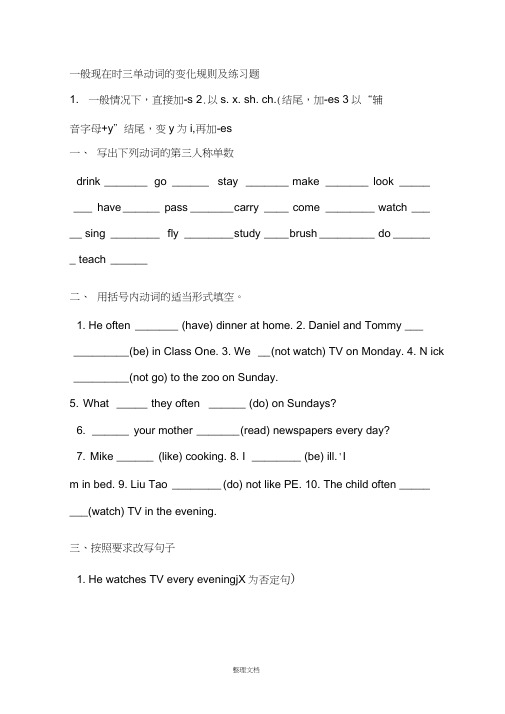
一般现在时三单动词的变化规则及练习题1. 一般情况下,直接加-s2.以s. x. sh. ch.(结尾,加-es 3以“辅音字母+y”结尾,变y为i,再加-es一、写出下列动词的第三人称单数drink _______ go ______ stay _______ make _______ look _____ ___ have ______ pass _______ c arry ____ come ________ watch ___ __ sing ________ fly ________ s tudy ____ b rush _________ do ______ _ teach ______二、用括号内动词的适当形式填空。
1. He often _______ (have) dinner at home.2. Daniel and Tommy ____________ (be) in Class One. 3. We __ (not watch) TV on Monday. 4. N ick _________ (not go) to the zoo on Sunday.5. What _____ they often ______ (do) on Sundays?6. ______ your mother _______ (read) newspapers every day?7. Mike ______ (like) cooking. 8. I ________ (be) ill.'Im in bed. 9. Liu Tao ________ (do) not like PE. 10. The child often _____ ___(watch) TV in the evening.三、按照要求改写句子1. He watches TV every eveningjX为否定句)2. I do my homework every day改为一般疑问句,作否定回答) ________________________________________________3. She likes books改为一般疑问句,做肯定回答)4. Amy likes playi ng computer game 改为一般疑问句,作否定回答) ______________________________________________________5. We go to school on Sundays改为否定句)四、改错(划出错误的地方,将正确的写在横线上)1. Is your brother like English? ___________________2. Does he likes swimming? _____________________3. He likes play games. ____________________4. Shedon 't do her homework on Sundays. _________________五、把句子补充完整。
小学动词第三人称单数讲解及练习
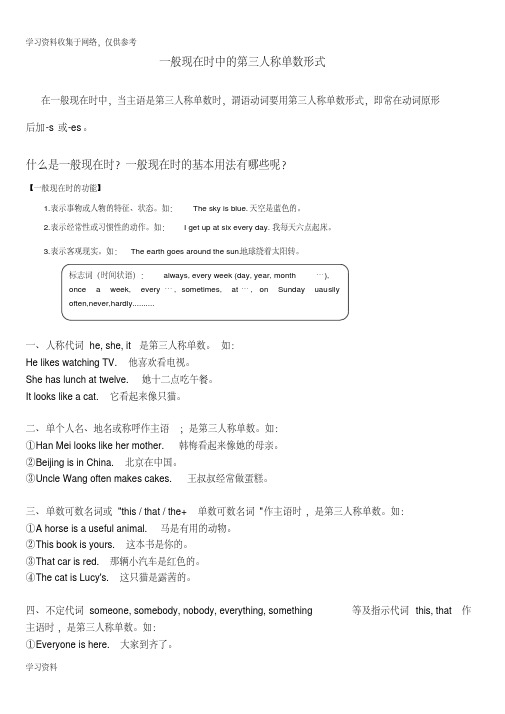
学习资料收集于网络,仅供参考学习资料一般现在时中的第三人称单数形式在一般现在时中,当主语是第三人称单数时,谓语动词要用第三人称单数形式,即常在动词原形后加-s 或-es 。
什么是一般现在时?一般现在时的基本用法有哪些呢?【一般现在时的功能】1.表示事物或人物的特征、状态。
如:The sky is blue.天空是蓝色的。
2.表示经常性或习惯性的动作。
如:I get up at six every day.我每天六点起床。
3.表示客观现实。
如:The earth goes around the sun.地球绕着太阳转。
一、人称代词he, she, it 是第三人称单数。
如:He likes watching TV. 他喜欢看电视。
She has lunch at twelve. 她十二点吃午餐。
It looks like a cat. 它看起来像只猫。
二、单个人名、地名或称呼作主语;是第三人称单数。
如:①Han Mei looks like her mother. 韩梅看起来像她的母亲。
②Beijing is in China. 北京在中国。
③Uncle Wang often makes cakes. 王叔叔经常做蛋糕。
三、单数可数名词或"this / that / the+单数可数名词"作主语时,是第三人称单数。
如:①A horse is a useful animal. 马是有用的动物。
②This book is yours. 这本书是你的。
③That car is red. 那辆小汽车是红色的。
④The cat is Lucy's. 这只猫是露茜的。
四、不定代词someone, somebody, nobody, everything, something 等及指示代词this, that 作主语时,是第三人称单数。
如:①Everyone is here. 大家到齐了。
一般现在时(第三人称单数形式_)及练习

般现在时(第三人称单数形式 )Hello, boys and girls我是一般现在时,你们想知道我的故事吗Let me tellyou!首先,介绍我的本领。
我的本领有三样:1.表示事物或人物的特征、状态。
如:The sky is blue天空是蓝色的。
2.表示经常性或习惯性的动作。
如:I get up at six every day我每天六点起床。
3.表示客观现实。
如:The earth goes aro und the sun 地球绕着太阳转。
第二,请看我的面目--构成:1.b e动词:主语+be(am ,is ,are)+其它。
如:I am a boy我是一个男孩。
2.行为动词:主语+行为动词(+其它)。
如:We study En glish我们学习英语。
当主语为第三人称单数(he, she ,it)时,三单变化:1.多数在动词后加s,play—plays like —likes2.以s,x,sh,ch,o 结尾的动词加es go—goes wash —washes4.以辅音字母加y 结尾,把y 改i 再加es,fly—flies 。
元音字母加y 结尾的,直接加s,play-plays 。
5.特殊:have-has第三,我的变化--否定句、一般疑问句、特殊疑问句:1.be 动词的变化。
否定句:主语+ be + not +其它。
如:He is not a worker他不是工人。
一般疑问句:Be +主语+其它。
如:-Are you a student -Yes. I am. / No, I'm not.特殊疑问句:疑问词+一般疑问句。
如:Where is my bike2.行为动词的变化。
否定句:主语+ don't( doesn't ) +动词原形(+其它)。
如:I don't like bread. 当主语为第三人称单数时,要用doesn't 构成否定句。
最新一般现在时态及第三人称单数(附练习及答案)
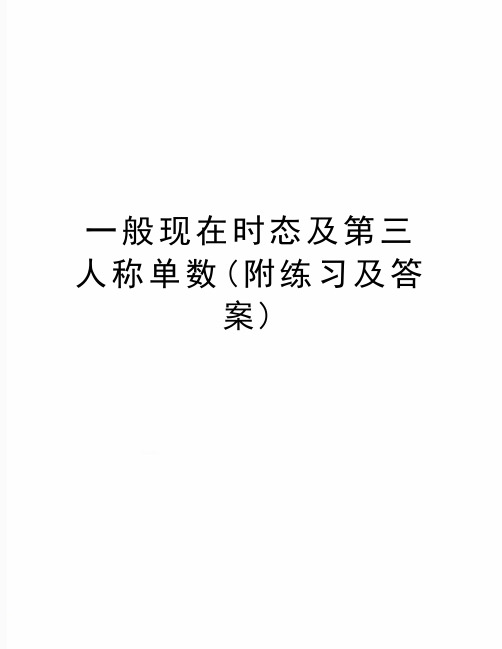
一般现在时态及第三人称单数(附练习及答案)一般现在时态及第三人称单数(附练习及答案)第三人称单数问题一般现在时中,当主语是第三人称单数时,即常在动词原形后加-s或-es。
第三人称单数变化,现归纳总结如下:1.人称代词he, she, it是第三人称单数。
如:He likes watching TV.他喜欢看电视。
She has lunch at twelve.她十二点吃午餐。
It looks like a cat.它看起来像只猫。
2.单个人名、地名或称呼作主语;用第三人称单数。
如:①Han Mei looks like her mother.韩梅看起来像她的母亲。
②Beijing is in China.北京在中国。
③Uncle Wang often makes cakes.王叔叔经常做蛋糕。
3.单数可数名词或"this / that / the/ a +单数可数名词"作主语时,是第三人称单数。
如:①A horse is a useful animal.马是有用的动物。
②This book is yours.这本书是你的。
③That car is red.那辆小汽车是红色的。
④The cat is Lucy's.这只猫是露茜的。
4.不定代词someone, somebody, nobody, everything, something等及指示代词this, that作主语时,第三人称单数。
①Everyone is here.大家到齐了。
②There is something wrong with the watch.这块手表有毛病。
③This is a pen.这是一支钢笔。
④That is an eraser.那是一块橡皮擦。
5.不可数名词作主语时为第三人称单数。
如:①The milk is in the glass. ②The bread is very small.6.当数字或字母作主语时,看作第三人称单数。
初一英语一般现在时第三人称单数形式规则 练习题及答案
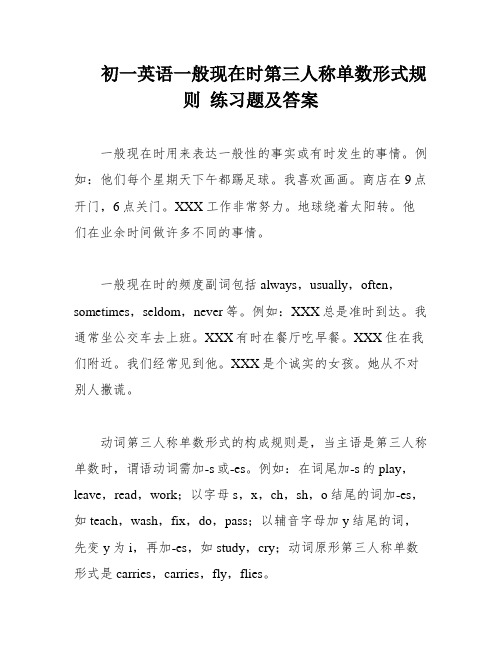
初一英语一般现在时第三人称单数形式规则练习题及答案一般现在时用来表达一般性的事实或有时发生的事情。
例如:他们每个星期天下午都踢足球。
我喜欢画画。
商店在9点开门,6点关门。
XXX工作非常努力。
地球绕着太阳转。
他们在业余时间做许多不同的事情。
一般现在时的频度副词包括always,usually,often,sometimes,seldom,never等。
例如:XXX总是准时到达。
我通常坐公交车去上班。
XXX有时在餐厅吃早餐。
XXX住在我们附近。
我们经常见到他。
XXX是个诚实的女孩。
她从不对别人撒谎。
动词第三人称单数形式的构成规则是,当主语是第三人称单数时,谓语动词需加-s或-es。
例如:在词尾加-s的play,leave,read,work;以字母s,x,ch,sh,o结尾的词加-es,如teach,wash,fix,do,pass;以辅音字母加y结尾的词,先变y为i,再加-es,如study,cry;动词原形第三人称单数形式是carries,carries,fly,flies。
练一:使用动词的正确形式boil,close,cost,like,meet,open,speak,XXX,wash。
例如:XXX会说四种语言。
1.XXX.2.We do not watch TV very often.3.How often do you wash your hair?4.Chris does not want to go to the cinema.5.Do you want to go out this evening?6.Does Ann live near here?1.Does Sara know a lot of people?2.I don't travel very often。
but I enjoy it.3.What time do you usually wake up in the morning?4.XXX't want to go to the party.5.Do you want to come with us to the park?6.Does Ann live in this neighborhood?7.Sara is familiar with a lot of people.8.Although I XXX。
一般现在时单三形式练习题

一般现在时单三形式练习题一般现在时是英语中最基础也最常用的时态之一。
它用来描述现在正在发生的事情、现实存在的事情、经常发生的事情以及普遍真理等。
在一般现在时中,动词的单数第三人称形式需要在动词末尾加上-s或-es。
以下是一些练习题,每个句子中都需要用到动词的单数第三人称形式:1. My cat usually __________ (sleep) on the windowsill in the afternoon.2. Alice __________ (speak) three languages fluently.3. The sun __________ (rise) in the east.4. He __________ (work) as a teacher at the local school.5. This plant __________ (require) a lot of sunlight to grow.6. The dog __________ (bark) loudly whenever someone knocks on the door.7. She always __________ (arrive) at work on time.8. The Earth __________ (rotate) on its axis once every 24 hours.9. John __________ (enjoy) playing basketball in his free time.10. It __________ (take) her 30 minutes to get to work every morning.参考答案:1. My cat usually sleeps on the windowsill in the afternoon.2. Alice speaks three languages fluently.3. The sun rises in the east.4. He works as a teacher at the local school.5. This plant requires a lot of sunlight to grow.6. The dog barks loudly whenever someone knocks on the door.7. She always arrives at work on time.8. The Earth rotates on its axis once every 24 hours.9. John enjoys playing basketball in his free time.10. It takes her 30 minutes to get to work every morning.在以上练习题中,动词的单数第三人称形式已经正确使用。
英语一般现在时题20套(带答案)含解析
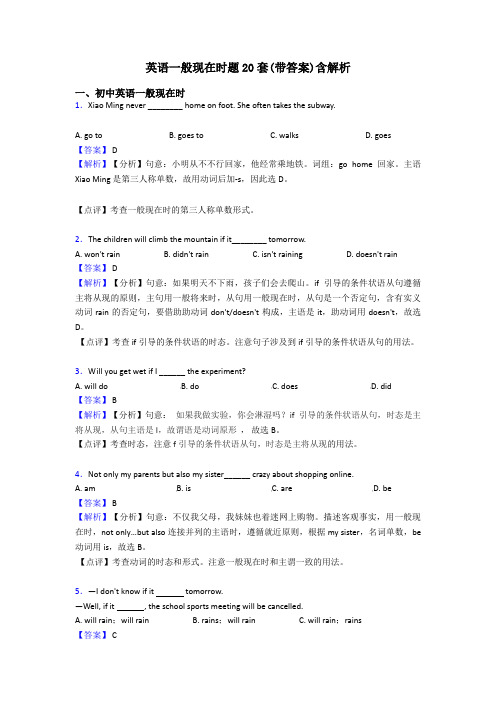
英语一般现在时题20套(带答案)含解析一、初中英语一般现在时1.Xiao Ming never ________ home on foot. She often takes the subway.A. go toB. goes toC. walksD. goes【答案】 D【解析】【分析】句意:小明从不不行回家,他经常乘地铁。
词组:go home回家。
主语Xiao Ming 是第三人称单数,故用动词后加-s,因此选D。
【点评】考查一般现在时的第三人称单数形式。
2.The children will climb the mountain if it________ tomorrow.A. won't rainB. didn't rainC. isn't rainingD. doesn't rain【答案】 D【解析】【分析】句意:如果明天不下雨,孩子们会去爬山。
if 引导的条件状语从句遵循主将从现的原则,主句用一般将来时,从句用一般现在时,从句是一个否定句,含有实义动词rain的否定句,要借助助动词don't/doesn't构成,主语是it,助动词用doesn't,故选D。
【点评】考查if引导的条件状语的时态。
注意句子涉及到if引导的条件状语从句的用法。
3.Will you get wet if I ______ the experiment?A. will doB. doC. doesD. did【答案】 B【解析】【分析】句意:如果我做实验,你会淋湿吗?if引导的条件状语从句,时态是主将从现,从句主语是 I,故谓语是动词原形,故选B。
【点评】考查时态,注意f引导的条件状语从句,时态是主将从现的用法。
4.Not only my parents but also my sister______ crazy about shopping online.A. amB. isC. areD. be【答案】 B【解析】【分析】句意:不仅我父母,我妹妹也着迷网上购物。
动词的第三人称单数及练习
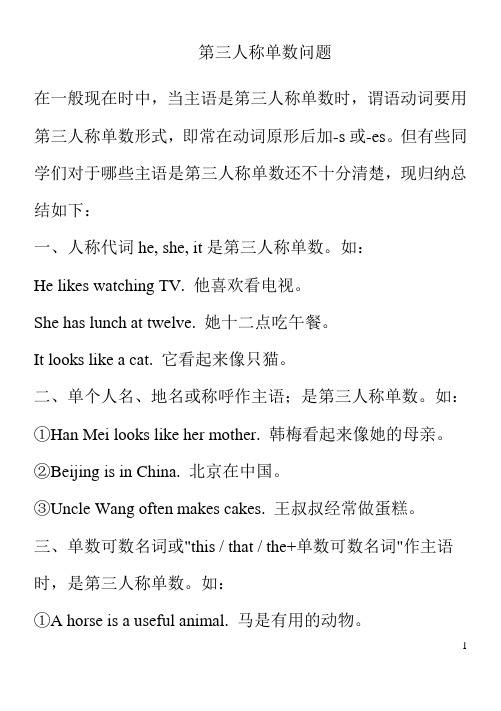
第三人称单数问题在一般现在时中,当主语是第三人称单数时,谓语动词要用第三人称单数形式,即常在动词原形后加-s或-es。
但有些同学们对于哪些主语是第三人称单数还不十分清楚,现归纳总结如下:一、人称代词he, she, it是第三人称单数。
如:He likes watching TV. 他喜欢看电视。
She has lunch at twelve. 她十二点吃午餐。
It looks like a cat. 它看起来像只猫。
二、单个人名、地名或称呼作主语;是第三人称单数。
如:①Han Mei looks like her mother. 韩梅看起来像她的母亲。
②Beijing is in China. 北京在中国。
③Uncle Wang often makes cakes. 王叔叔经常做蛋糕。
三、单数可数名词或"this / that / the+单数可数名词"作主语时,是第三人称单数。
如:①A horse is a useful animal. 马是有用的动物。
②This book is yours. 这本书是你的。
③That car is red. 那辆小汽车是红色的。
④The cat is Lucy's. 这只猫是露茜的。
四、不定代词someone, somebody, nobody, everything, something等及指示代词this, that作主语时,是第三人称单数。
如:①Everyone is here. 大家到齐了。
②There is something wrong with the watch. 这块手表有毛病。
③This is a pen. 这是一支钢笔。
④That is an eraser. 那是一块橡皮擦。
五、不可数名词作主语时为第三人称单数。
如:①The milk is in the glass. 牛奶在玻璃杯里。
②The bread is very small. 那面包很小。
一般现在时(第三人称单数形式_)及练习
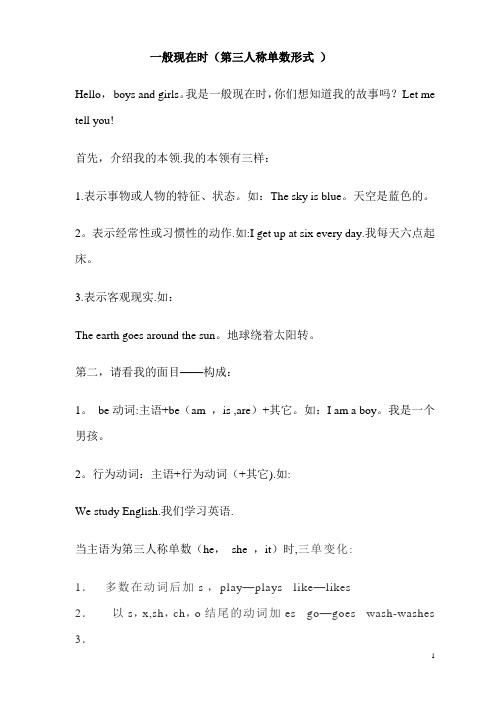
一般现在时(第三人称单数形式)Hello,boys and girls。
我是一般现在时,你们想知道我的故事吗?Let me tell you!首先,介绍我的本领.我的本领有三样:1.表示事物或人物的特征、状态。
如:The sky is blue。
天空是蓝色的。
2。
表示经常性或习惯性的动作.如:I get up at six every day.我每天六点起床。
3.表示客观现实.如:The earth goes around the sun。
地球绕着太阳转。
第二,请看我的面目——构成:1。
be动词:主语+be(am ,is ,are)+其它。
如:I am a boy。
我是一个男孩。
2。
行为动词:主语+行为动词(+其它).如:We study English.我们学习英语.当主语为第三人称单数(he,she ,it)时,三单变化:1.多数在动词后加s ,play—plays like—likes2.以s,x,sh,ch,o结尾的动词加es go—goes wash-washes 3.4.以辅音字母加y结尾,把y改i再加es,fly—flies 。
元音字母加y结尾的,直接加s,play—plays.5.特殊:have—has第三,我的变化——否定句、一般疑问句、特殊疑问句:1.be动词的变化。
否定句:主语+ be + not +其它。
如:He is not a worker。
他不是工人。
一般疑问句:Be +主语+其它。
如:-Are you a student?—Yes。
I am。
/ No, I'm not。
特殊疑问句:疑问词+一般疑问句.如:Where is my bike?2.行为动词的变化。
否定句:主语+ don’t(doesn’t ) +动词原形(+其它)。
如:I don't like bread。
当主语为第三人称单数时,要用doesn't构成否定句.如:He doesn't often play.一般疑问句:Do(Does ) +主语+动词原形+其它。
一般现在时主语三单的动词变化与练习
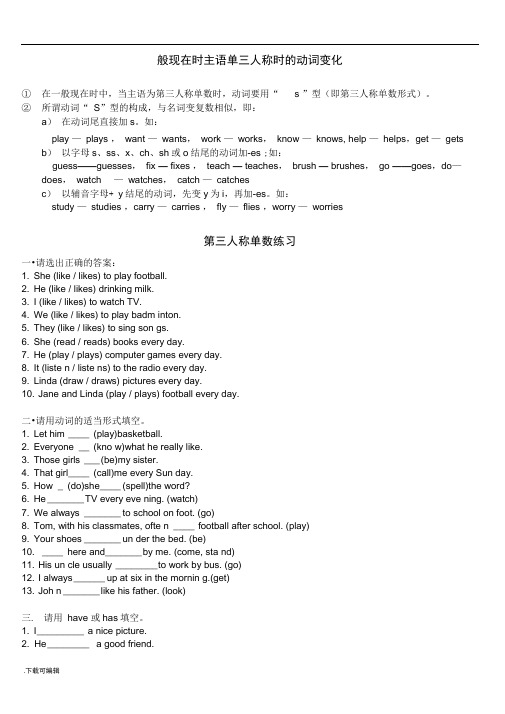
般现在时主语单三人称时的动词变化①在一般现在时中,当主语为第三人称单数时,动词要用“s ”型(即第三人称单数形式)。
②所谓动词“ S”型的构成,与名词变复数相似,即:a)在动词尾直接加s。
如:play —plays ,want —wants,work —works,know —knows, help —helps,get —gets b)以字母s、ss、x、ch、sh或o结尾的动词加-es ;如:guess——guesses,fix — fixes ,teach — teaches,brush — brushes,go ——goes,do—does,watch —watches,catch —catchesc)以辅音字母+ y结尾的动词,先变y为i,再加-es。
如:study —studies ,carry —carries ,fly —flies ,worry —worries第三人称单数练习一•请选出正确的答案:1. She (like / likes) to play football.2. He (like / likes) drinking milk.3. I (like / likes) to watch TV.4. We (like / likes) to play badm inton.5. They (like / likes) to sing son gs.6. She (read / reads) books every day.7. He (play / plays) computer games every day.8. It (liste n / liste ns) to the radio every day.9. Linda (draw / draws) pictures every day.10. Jane and Linda (play / plays) football every day.二•请用动词的适当形式填空。
小学动词第三人称单数形式用法+练习

小学动词第三人称单数形式用法+练习一般现在时中的第三人称单数形式一般现在时用于表示事物或人物的特征、状态、经常性或惯性的动作,以及客观现实。
当主语为第三人称单数时,谓语动词应使用第三人称单数形式,即在动词原形后加-s或-es。
一般现在时的基本用法一般现在时有以下基本用法:1.表示事物或人物的特征、状态,如“天空是蓝色的”;2.表示经常性或惯性的动作,如“我每天六点起床”;3.表示客观现实,如“地球绕着太阳转”。
标志词(时间状语)包括always。
every week (day。
year。
month…)。
once a week。
every…。
sometimes。
at…。
on Sunday。
usually。
often。
never。
hardly等。
哪些主语是第三人称单数?以下主语是第三人称单数:1.人称代词he。
she。
it,如“他喜欢看电视”;2.单个人名、地名或称呼作主语,如“XXX看起来像她的母亲”;3.单数可数名词或“this / that / the+单数可数名词”作主语时,如“马是有用的动物”;4.不定代词someone。
somebody。
nobody。
everything。
something等及指示代词this。
that作主语时,如“大家到齐了”。
1.This is a pen。
(改写) This object is a XXX.2.That is an eraser。
(改写) The object over there is a rubber eraser.3.The milk is in the glass。
(改写) The glass contains milk.4.The bread is very small。
(改写) The size of the bread isvery small.5."6" is a lucky number。
(改写) The number "6" is XXX.6."I" XXX(改写) The character "I" is a letter.7.大多数动词在词尾加“S”。
一般现在时第三人称单数形式用法+练习
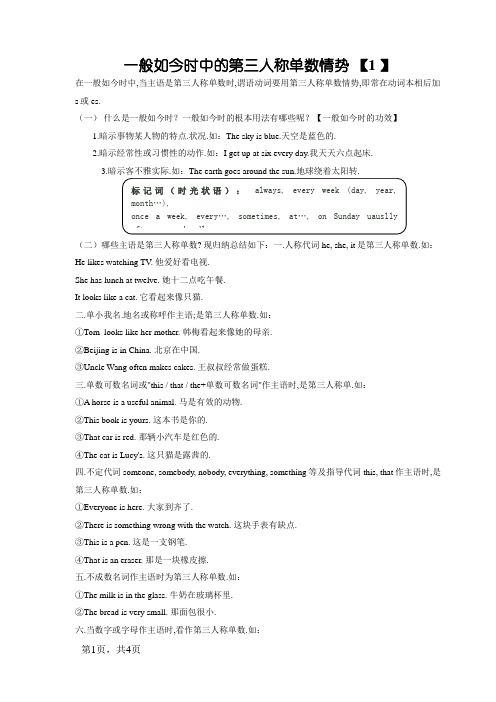
一般如今时中的第三人称单数情势【1 】在一般如今时中,当主语是第三人称单数时,谓语动词要用第三人称单数情势,即常在动词本相后加s或es.(一)什么是一般如今时?一般如今时的根本用法有哪些呢?【一般如今时的功效】1.暗示事物某人物的特点.状况.如:The sky is blue.天空是蓝色的.2.暗示经常性或习惯性的动作.如:I get up at six every day.我天天六点起床.3.暗示客不雅实际.如:The earth goes around the sun.地球绕着太阳转.(二)哪些主语是第三人称单数? 现归纳总结如下:一.人称代词he, she, it是第三人称单数.如:He likes watching TV. 他爱好看电视.She has lunch at twelve. 她十二点吃午餐.It looks like a cat. 它看起来像只猫.二.单小我名.地名或称呼作主语;是第三人称单数.如:①Tom looks like her mother. 韩梅看起来像她的母亲.②Beijing is in China. 北京在中国.③Uncle Wang often makes cakes. 王叔叔经常做蛋糕.三.单数可数名词或"this / that / the+单数可数名词"作主语时,是第三人称单.如:①A horse is a useful animal. 马是有效的动物.②This book is yours. 这本书是你的.③That car is red. 那辆小汽车是红色的.④The cat is Lucy's. 这只猫是露茜的.四.不定代词someone, somebody, nobody, everything, something等及指导代词this, that作主语时,是第三人称单数.如:①Everyone is here. 大家到齐了.②There is something wrong with the watch. 这块手表有缺点.③This is a pen. 这是一支钢笔.④That is an eraser. 那是一块橡皮擦.五.不成数名词作主语时为第三人称单数.如:①The milk is in the glass. 牛奶在玻璃杯里.②The bread is very small. 那面包很小.六.当数字或字母作主语时,看作第三人称单数.如:①"6" is a lucky number. "6"是个吉利数字.②"I" is a letter. "I"是个字母.PS:除上述纪律外,还应留意下面三点:1. 动词 have ,碰到主语是第三人称单数时,要用 has; 动词be 的第三人称单数情势是is.2. 含有动词第三人称单数情势的句子变否认句时,要用 doesn't + 动词本相,如:He goes to school at six in the morning. (变否认句)→He doesn't go to school at six in the morning.3. 对含有动词第三人称单数情势的句子提问时,要用助动词does,如:She goes home at five every day. (对划线部分提问)→When / What time does she go home every day?(三)一般如今时动词第三人称单数情势组成规矩(一般如今时中主语时第三人称1.大多半动词在词尾加“S”如:①stop-stops make-makes read-reads play-plays2.以子音字母加“y”结尾的,要先将“y”变成“i”,然后在加“es”;以元音字母加“y”结尾的,直接加“S” 如:fly-flies carry-carries study-studies worry-worries3.以“s, x, ch, sh”结尾的,在词尾加“es”,发音为如:teach-teaches watch-watches4.以“o”结尾的动词,加“es”,如:go-goes do-does5.以不发音字母“e”结尾的开音节词,加“s” 如: close-closes [iz]6.特别:○1. be动词包含:am, is, are.第三人称单数用 is;曩昔式为 was;复数用are,曩昔式为were.○2. 动词 have ,碰到主语是第三人称单数时,要用 has; 动词 be 的第三人称单数情势is.(四)巩固演习题:一. 写出下列动词的第三人称单数情势:sit guess die gorush reach touch brushfly copy say rundo fix live cryenjoy have wish playtie teach buy studydrink go stay makelook carry come watchplant fly do二.用括号内动词的恰当情势填空.1. He often ________(have) dinner at home.2. Daniel and Tommy _______(be) in Class One.3. We _______(not watch) TV on Monday.4. Nick _______(not go) to the zoo on Sunday.5. ______ they ________(like) the World Cup?6. What _______they often _______(do) on Saturdays?7. _______ your parents _______(read) newspapers every day?8. The girl _______(teach) us English on Sundays.9. She and I ________(take) a walk together every evening.10. There ________(be) some water in the bottle.11. Mike _______(like) cooking.12. They _______(have) the same hobby.13. My aunt _______(look) after her baby carefully.14. You always _______(do) your homework well.15. I _______(be) ill. I’m stayi ng in bed.16. She _______(go) to school from Monday to Friday.17. Liu Tao _______(do) not like PE.18. The child often _______(watch) TV in the evening.19. Su Hai and Su Yang _______(have) eight lessons this term.20. -What day _______(be) it today?-It’s Saturday三.不雅察下面两组句子,留意区分do和does,don’t和doesn’t.I go to school every day. I don't go to school every day.He goes to school every day. He doesn't go to school every day. Do you go to school every day? Yes, I do. (No, I don't)Does he go to school every day? Yes, he does. (No, he doesn't)注:(1)确定句变否认句,第三人称单数把does变doesn’t(does not),其余把do变don’t(do not),后面跟动词本相.(一请一还原)(2)变成一般疑问句,要在句首加"do" 或does ,这取决于主语是否第三人称单数.教室演习:把下列句子改成一般疑问句和否认句.1.I usually get up at six o’clock.(并作确定答复)2. We usually write emails on Saturday evening.(并作否认答复).3. They have the same hobby.(并作确定答复).4.Suhai and Su yang like listening to music after school.(并作否认答复)5.Helen usually watches TV in the evening.(并作确定答复)。
- 1、下载文档前请自行甄别文档内容的完整性,平台不提供额外的编辑、内容补充、找答案等附加服务。
- 2、"仅部分预览"的文档,不可在线预览部分如存在完整性等问题,可反馈申请退款(可完整预览的文档不适用该条件!)。
- 3、如文档侵犯您的权益,请联系客服反馈,我们会尽快为您处理(人工客服工作时间:9:00-18:30)。
一般现在时(第三人称单数形式)Hello, boys and girls.我是一般现在时,你们想知道我的故事吗Let me tell you!首先,介绍我的本领。
我的本领有三样:1.表示事物或人物的特征、状态。
如:The sky is blue.天空是蓝色的。
2.表示经常性或习惯性的动作。
如:I get up at six every day.我每天六点起床。
3.表示客观现实。
如:The earth goes around the sun.地球绕着太阳转。
第二,请看我的面目--构成:1. be动词:主语+be(am ,is ,are)+其它。
如:I am a boy.我是一个男孩。
2.行为动词:主语+行为动词(+其它)。
如:We study English.我们学习英语。
当主语为第三人称单数(he, she ,it)时,三单变化:1.多数在动词后加s,play—plays like—likes2.以s,x,sh,ch,o结尾的动词加es go—goes wash—washes 3.4.以辅音字母加y结尾,把y改i再加es,fly—flies。
元音字母加y结尾的,直接加s,play-plays。
5.特殊:have-has第三,我的变化--否定句、一般疑问句、特殊疑问句:1.be动词的变化。
否定句:主语+ be + not +其它。
如:He is not a worker.他不是工人。
一般疑问句:Be +主语+其它。
如:-Are you a student -Yes. I am. / No, I'm not.特殊疑问句:疑问词+一般疑问句。
如:Where is my bike2.行为动词的变化。
否定句:主语+ don't( doesn't ) +动词原形(+其它)。
如:I don't like bread.当主语为第三人称单数时,要用doesn't构成否定句。
如:He doesn't often play.一般疑问句:Do( Does ) +主语+动词原形+其它。
如:- Do you often play football- Yes, I do. / No, I don't.当主语为第三人称单数时,要用does构成一般疑问句。
如:- Does she go to work by bike- Yes, she does. / No, she doesn't.特殊疑问句:疑问词+一般疑问句。
如:How does your father go to work动词第三人称单数形式的练习写出下列动词的第三人称单数。
drink ________ go _______ stay ________make ________ look _________have_______ pass_______ carry ____come________ watch______plant_______ fly ________ study_______brush________ teach_______用括号内动词的适当形式填空。
often ________(have) dinner at home.(not watch) TV on Monday._______(not go) to the zoo on Sunday.they ________(like) the World Cup_______they often _______(do) on Saturdaysyour parents _______(read) newspapers every daygirl _______(teach) us English on Sundays.and I ________(take) a walk together every evening.________(be) some water in the bottle._______(like) cooking._______(have) the same hobby.aunt _______(look) after her baby carefully.always _______(do) your homework well._______(be) ill. I’m staying in bed._______(go) to school from Monday to Friday.Tao _______(do) not like PE.child often _______(watch) TV in the evening.Hai and Su Yang _______(have) eight lessons this term.19 Mike’s sister________ (cook) nice food. I _______ (like)eating it very much.20_______ (do) your father_______ (watch) TV in the evening No, he_______ (not).21 Tom usually_______ (play) football after school22 He _______ (live) in a small town near Nanjing.23 I like_______ (cook) and_______ (grow) flowers.24 I ______ (go ) to school by bus, and he ______(go) to school by bike.25 Who ________ (sing) beautifully in your class Jim.二、把下列动词变为第三人称单数形式。
1. clean--2. go--3. have--4. do--5. play--6. fly--7. come--8. brush--9. watch--10. study--11. ask--12.answer--13. swim--14. catch--15. write--16. eat--17. make--18. paint--19. learn--20. phone--21. run--22. hop--23. sing--24. pick--三、选出正确的答案:1. She (like / likes) to play . He (like / likes) drinking milk.3. I (like / likes) to watch . We (like / likes) to play badminton.5. They (like / likes) to sing . She (read / reads) books every day.7. He (play / plays) computer games every day.8. It (listen / listens) to the radio every day.9. Linda (draw / draws) pictures every day.10. Jane and Linda (play / plays) football every day.四、选择题:1. I to school every day.A. goB. goesC. going2. He teeth every morning.A. brushB. brushesC. brushing3. The birds singing.A. likeB. likesC. like to4. What does Lily doingA. likeB. likesC. to5. you like eating applesA. DoB. DoesC. Doing6. he swim every afternoonA. DoB. DoesC. Doing7. Tom likes in the classroom.A. singingB. singC. to singing8. –Does Sally like swimming--No, she .9. Peter and Mary milk every day.A. drinkB. drinkingC. drinks10. they read English every dayA. DoesB. ToC. Do五、把下列句子变为否定句:1. She draws pictures every day._______________________________________________2. We like playing football.3. Linda swims every day._______________________________________________4. They like playing games.5. My father reads newspaper in the evening.________________________________________________6. He likes drawing pictures .________________________________________________六、把下列句子变为疑问句,并做肯定回答。
1. My father can ride a horse._______________________2. she does her homework at home3. Miss Green likes dancing very much.________________________4. we clean the classroom.______________________________________________5. My mother cooks the meals._______________________6. I clean the bedroom everyday.______________________________________________read books in the classroom.________________________children sing in the music room._______________________。
